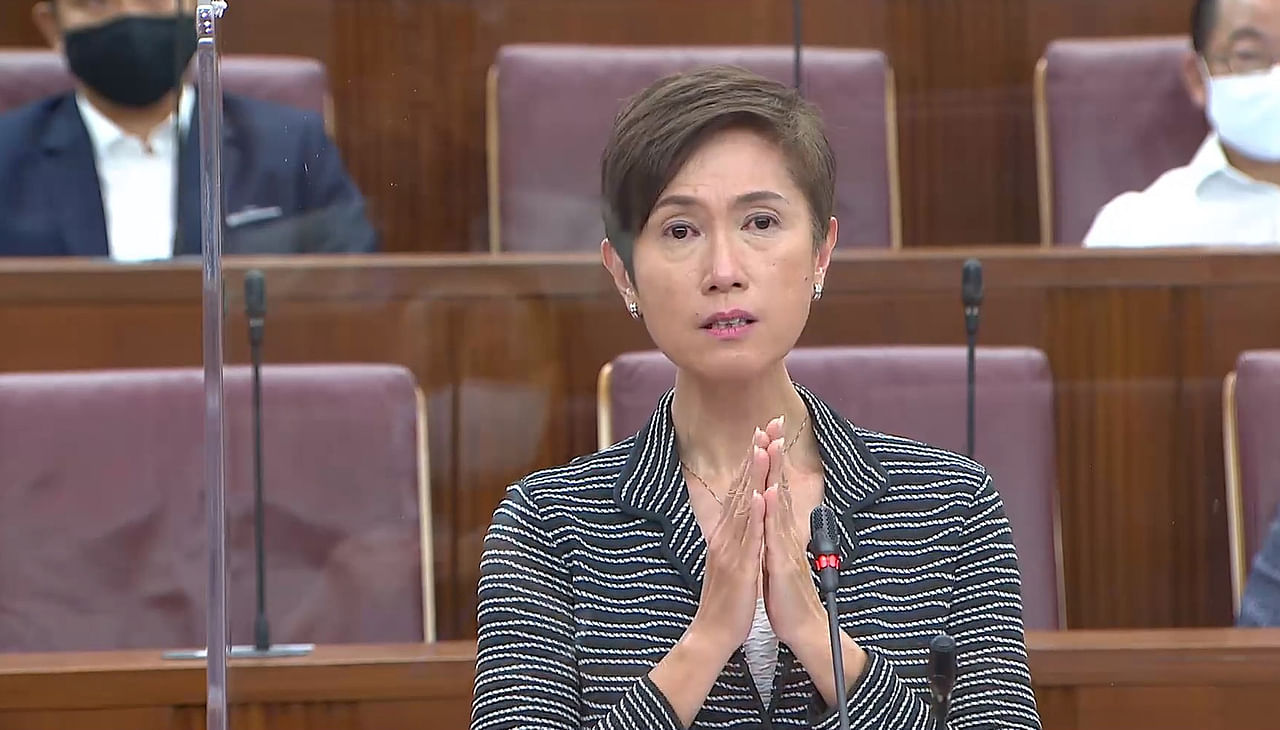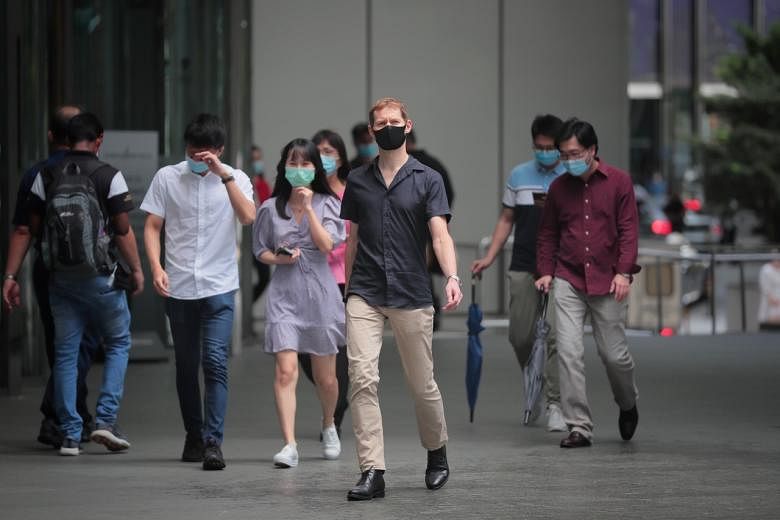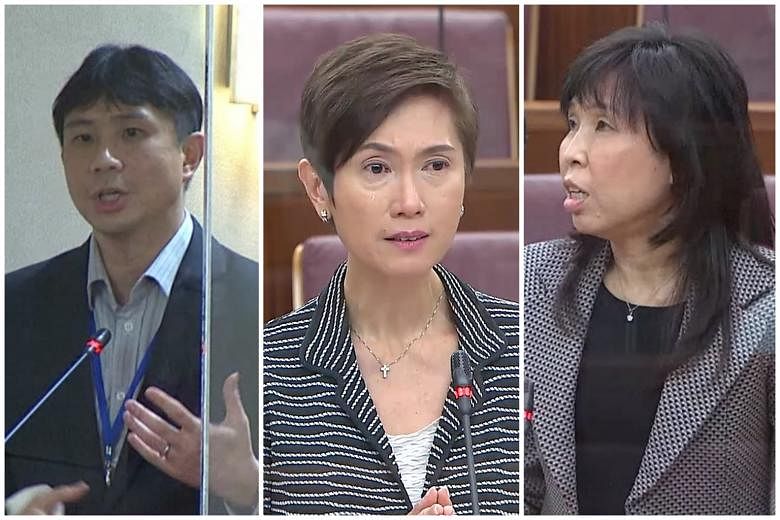SINGAPORE - The debate on the President's Address continued on Tuesday (Sept 1), and saw 18 MPs speak on the main issues facing the Government.
Here are some lively moments from the second day of the debate, which spanned about 6½ hours.
1. WHEN JAMUS LIM CROSSED SWORDS WITH JESSICA TAN, JOSEPHINE TEO OVER EMPLOYMENT DATA
Workers' Party MP Jamus Lim (Sengkang GRC), an economist, crossed swords with Manpower Minister Josephine Teo and Deputy Speaker of Parliament Jessica Tan, when he pointed out that it could be misleading to compare data on the rate of Employment Passes (EP) and S Passes issued.
Addressing concerns about Singapore's work pass policies in her speech, Mrs Teo said her ministry has slowed down the growth of EP and S Pass holders considerably. In the last five years, the number of EP and S Pass holders has grown by less than 9,000 annually on average - less than one-third of the average annual growth of 30,400 in the earlier five-year period.
But Associate Professor Lim said slowing down the rate of issuance is a "very blunt strategy" for ensuring that local professionals, managers, executives and technicians (PMETs) do not get displaced.
He then contended that the slowdown in the rate of EP and S Pass issuance is less dramatic than what Mrs Teo had depicted, as base effects need to be taken into account.
"For instance, a 20 per cent increase from 50 people, for example, is 10 people, but a 10 per cent increase from 200 people is in fact an increase of 20 people, which is larger in absolute terms," he said.
Mrs Teo countered that she was merely stating the facts, rather than suggesting that the slowdown in the rate of work pass issuance helped to address the issue of local PMETs being displaced.
Weighing in, Ms Tan (East Coast GRC) asked Dr Lim for suggestions on the numbers that Singapore should look at, given the issues he had earlier pointed out with the numbers "not tallying up".
Replying, Dr Lim said he was not suggesting that the numbers were incorrect. He added that he had sought to highlight that simply decreasing the number of EP and S Pass holders was a "blunt instrument".
Ms Tan continued to press Dr Lim to come up with alternative suggestions in managing the issue of PMET jobs.
"Are you suggesting that we stop the number of EPs completely or S Passes?" she asked, calling on him to consider the implications of such a move on companies and Singaporean jobs.
Dr Lim did not respond to this, but said Singapore should not be looking at pure numbers in order to make conclusions about whether PMETs are being displaced.
2. WOULD WP CHAIRMAN SYLVIA LIM PASS A TEST OF 'CHINESE-NESS'?
Workers' Party chairman Sylvia Lim, who was brought up in an English-speaking family and attended a mission school, found herself "constantly feeling inadequate" about the state of her Mandarin.
"Before I entered politics, my knowledge of Chinese customs and practices was focused on celebrating Chinese New Year," she recalled of her limitations in this area, which she said she was not proud of.
She shared her personal story to make a point about how she, as a member of the Chinese majority, does not need to pass a test of "Chinese-ness" to qualify as a candidate in the general election.
On the other hand, electoral requirements under Singapore's group representation constituency system tend to put a focus on minority representation, which she said can put an uncomfortable spotlight on minority candidates who must file an application to show they are "Malay enough" or "Indian enough" to qualify for an election.
Ms Lim (Aljunied GRC) said the role of race in elections should be reviewed as part of steps to move towards a race-blind society.
She also suggested several areas that could be reviewed, including the Chinese, Malay, Indian and Other model of ethnic classification and the Housing Board's Ethnic Integration Policy.
3. WHY MANPOWER MINISTER JOSEPHINE TEO GOT EMOTIONAL
The Covid-19 pandemic has put severe stress on the workforce, affecting various groups of workers including mid-career professionals, managers, executives and technicians (PMETs), who are concerned about fair treatment and fair opportunities.
Manpower Minister Josephine Teo's speech took an emotional turn when she teared up while pledging to help affected groups of workers with the problems they face amid the crisis.

Such workers are on the minds of her and her team at the Ministry of Manpower (MOM) every single day, she said.
"We are always here, listening to their struggles, thinking deeply about the support that they need, recognising the constraints, adjusting policies in their best interests , and finding better ways to protect them against unfair practices, ultimately, helping them get onto the path of growth in their work lives that they so deserve.
"Please know that you too are always in our hearts. However long the storm lasts, MOM will walk this journey with you.
"However tough it may be, we will help you bounce back," said Mrs Teo, her voice wavering as she choked back tears.
4. PSP'S LEONG MUN WAI DELIVERS MAIDEN SPEECH, DRAWS RESPONSE FROM PAP'S DERRICK GOH
Non-Constituency MP Leong Mun Wai of the Progress Singapore Party hammered home the need to regulate the numbers of foreigners in firms here and restore the balance of interests between Singaporeans and foreigners in his maiden speech.
But a comment that he made about the leadership composition of local bank DBS drew a swift rebuttal from Mr Derrick Goh (Nee Soon GRC), a managing director and head of group audit at DBS Bank.
Mr Leong had noted that from the turn of the millennium, the Government had introduced a different brand of foreign talent. A high-profile manifestation of that policy was the appointment of Mr John Olds as the chief executive officer of DBS Bank in 1998, said Mr Leong, a former managing director of OCBC Securities.
He recounted a senior Japanese banker telling him: "Leong-san, it's like having a foreigner to run Mitsubishi Bank in Japan. It's unthinkable!"
Mr Leong told the House he had supported Mr Olds' appointment. "However, I am deeply disappointed now because 22 years after his appointment, DBS is still without a home-grown CEO."
This prompted Mr Goh to clarify, saying all members of DBS' top management team are Singaporean, except for one person, who is a Malaysian and a permanent resident.
The bank's current CEO, Mr Piyush Gupta, was born in India and became a Singapore citizen in 2009.
5. WILL SINGAPORE SINK LIKE THE TITANIC?
When the British luxury passenger liner Titanic embarked on its maiden journey in 1912, it was an engineering marvel of its time that was deemed unsinkable. Yet, it struck an iceberg and sank, killing more than 1,500 people, partly due to the fact that it did not carry enough functioning lifeboats for everyone on board.
Workers' Party MP Leon Perera (Aljunied GRC) used this example to draw a metaphor, warning against complacency when it comes to assessing Singapore's economy, which has been billed to be "brilliantly engineered and painstakingly maintained through sound policy".

The lack of functioning lifeboats on the Titanic contributed to the disaster, he noted, warning that in the same vein, insufficient social safety nets for Singapore will undermine the confidence and peace of mind of Singaporeans, among other things.
This prompted Senior Minister of State for Defence Heng Chee How to offer an alternative take.
Mr Heng, who is also National Trades Union Congress deputy secretary-general, was more optimistic.
Singapore is aware that its economy is one that is constantly changing, which is why the Government has rolled out industry transformation maps and works closely with businesses and workers to adapt to the changing needs of the economy, he said.
In other words, Singapore's economy is unlike the Titanic, a one-time invention that was "used until it (fell) apart", said Mr Heng.
"We know we have to transform. In fact, (this transformation is) not fast enough, and that is our worry. It is not that we are so fixated with this sophistication of our model that we say we don't need to change. We need to change, we have to transform, (we look at) how to transform. So, in that sense, we are not the Titanic."



